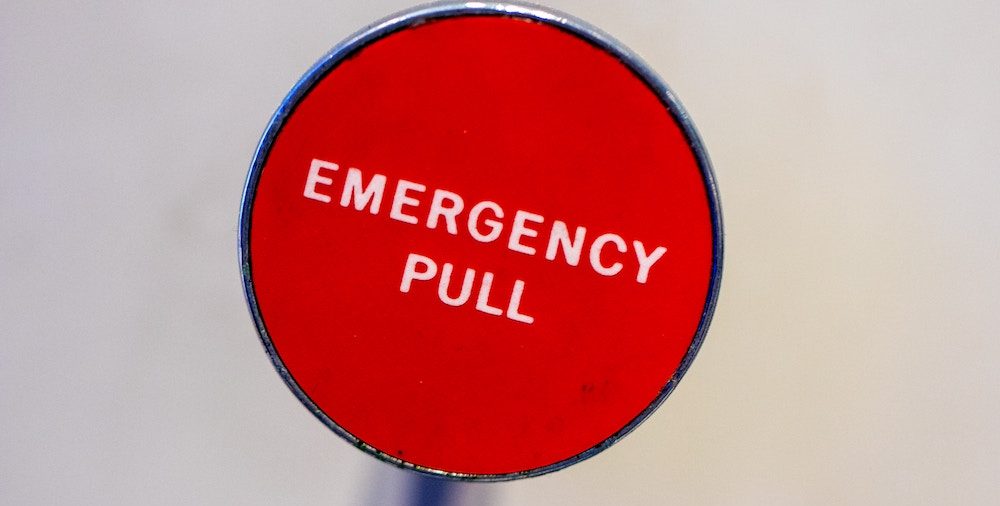We live in uncertain times, with some crazy things happening. Most recently, the US government shutdown extending longer than any other shutdown ever has (35 days), was really an eye opener for people and their finances. Seeing 800,000 US government employees missing 2 paychecks made a lot of people consider their own finances and many wondered if they could survive without 2 paychecks. Even a personal finance blogger like me wondered what it would feel like and thought about what I would do. Thankfully the government opened back up and most of the employees got back pay for the 2 missed paychecks. As crazy as this whole event was, it really reinforced the importance of having an emergency fund. I thought now was as good a time as ever to bring the topic up for discussion.

Why living paycheck to paycheck doesn’t work
78% of Americans live paycheck to paycheck, according to a CNBC article. Living paycheck to paycheck can work, until something goes wrong, and if there’s one thing I’ve learned, something will go wrong. Whether it’s something little like an unexpected car issue or a trip to the ER, or even as bad as a layoff, the reality is most (if not all) of us will face a financial crisis sometime in our life. Let’s pause right there and consider that fact. We all will face a financial crisis, and 78% of us living paycheck to paycheck may or may not be able to weather that storm. Perhaps we could turn to friends, family, or a loan of sorts, but none of those can be counted on, and could definitely put a strain on relationships or our finances (paying interest). With a personal financial crisis, it’s not a matter of if, but when. The shutdown and seeing 78% of the 800,000 people should be a wakeup call!
Regardless of your situation, you need an Emergency Fund
I realize that income inequality is a real thing we face in our world today and that it’s not fair. I understand that depending on where you’re born or into what social group you’re born can affect your education, income level and earning potential. However, that’s a topic for a different post. No matter who you are, how much you make or how much debt you have, you MUST have an emergency fund established. Being one bad event away from financial ruin is not acceptable. I understand that there are bills to pay, food to put on the table and gas in your car, but you can’t just wait until “things are better” to start an emergency fund. The recommended emergency fund level is 3-6 months of your expenses stashed away, which honestly is fairly realistic. A bad accident or a layoff could take months to recover from. 3-6 months can be aggressive for some, so start small. Try to save 1 month’s worth of expenses, and if 1 month is too hard, try to save $1,000. Even if it takes you a year, save $85/month or $42.50/paycheck.
Rest easy with an emergency fund
Setting up an emergency fund will do some pretty incredible things for your psyche. Even if it’s $1,000…having that set aside for a rainy day will improve your outlook. Perhaps you won’t toss and turn as much at night falling asleep, perhaps you won’t rub your lucky 4-leaf clover every time you get into the car. Maybe you won’t cringe every time your boss calls your name. 78% of Americans are living with the fear that one missed paycheck will financially ruin them. Don’t be in that statistic and have more inner peace knowing that you could weather a financial storm.
How/where to save it
The critical point of having an emergency fund is that you shouldn’t touch it unless there’s a real emergency. What’s a real emergency? You’ll know when you face it. In terms of where to save it, I’d strongly recommend keeping it saved in a savings account that’s separate from your normal savings account. Even better, perhaps keep it in a separate bank altogether, that way it’s harder to touch/access, and doing so would force you to be sure it’s a real emergency. If it’s easily accessible you may loosen up on what an emergency really is (“that new pair of shoes is on sale so much I have to have them”) and be tempted to use it. An even better incentive to keep it in a separate bank is to get a higher interest rate. Capital One, American Express or Ally are all solid online banks that a) don’t charge fees and b) pay a ton more interest vs the regular banks (1 or 2% vs 0.01%). It won’t make you rich but if it’s tucked away somewhere, you might as well be earning as much interest as you can.
In terms of how to save it, first set a reasonable goal for yourself. A lot of times we give up on our goals because we set them too aggressively. We quickly realize it’s unattainable and give up. So, to avoid that, set a reasonable goal. Start with saving $1,000. Break it down over a period of time and figure out the math. Commit to contributing a fixed amount to your new savings account each paycheck. Forgo eating out, say no to the new pair of shoes, skip the movie, do whatever it takes to save that amount each paycheck. If you miss your goal once or twice, don’t give up! Recommit to your goal the next month. What’s important is progress, not the actual number.
Having an emergency fund is crucial to weathering a financial storm that we’ll inevitably face. Start small, don’t give up, keep the money separate and start resting easier with the peace of mind that you’re protected!


 Personal Finances are certainly top of mind for many of us. If you're looking to get serious about improving your financial situation, we've got lots of great materials all over this site! Additionally, we realize that there's a lot of noise out there, and so we created PERSONAL FINANCIAL GUIDES focused on topics with all the info you need, and without any of the noise/ads/clickbait.
Personal Finances are certainly top of mind for many of us. If you're looking to get serious about improving your financial situation, we've got lots of great materials all over this site! Additionally, we realize that there's a lot of noise out there, and so we created PERSONAL FINANCIAL GUIDES focused on topics with all the info you need, and without any of the noise/ads/clickbait.
[…] here is unexpected, meaning that you can’t plan it in your budget. However, what you can do is prepare an emergency fund to cover your back in case of uncertainty. You can’t live paycheck to paycheck as this could […]
[…] other issues. Another frequent reason people hire a private detective is to conduct a business or government background check. Just like a person, all businesses have a past and a culture. If you are planning […]